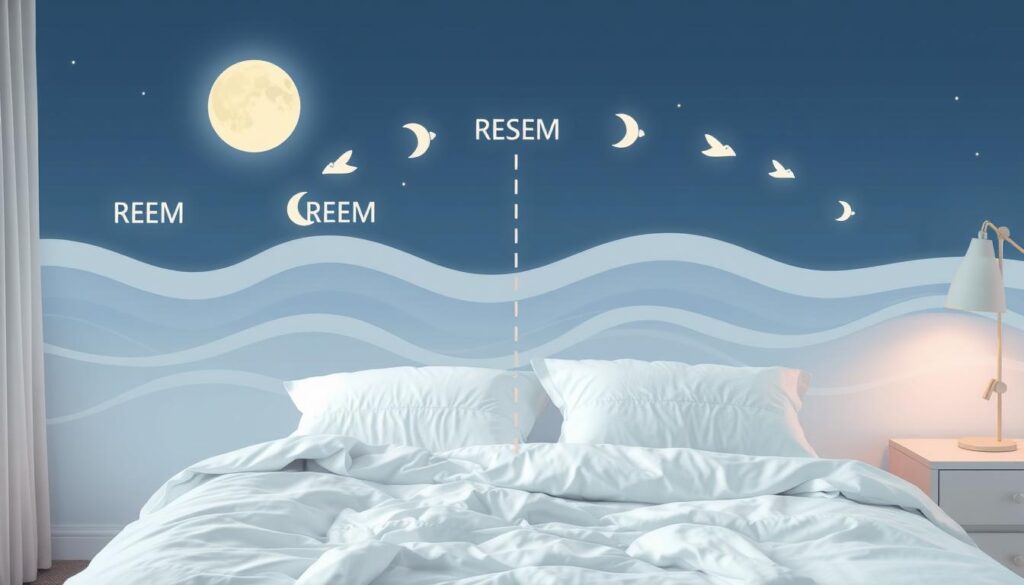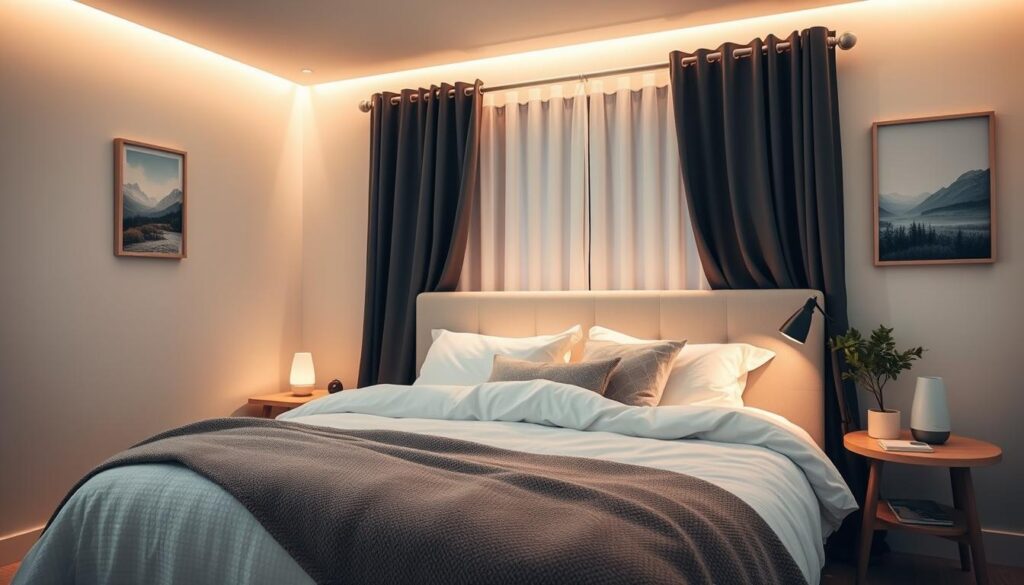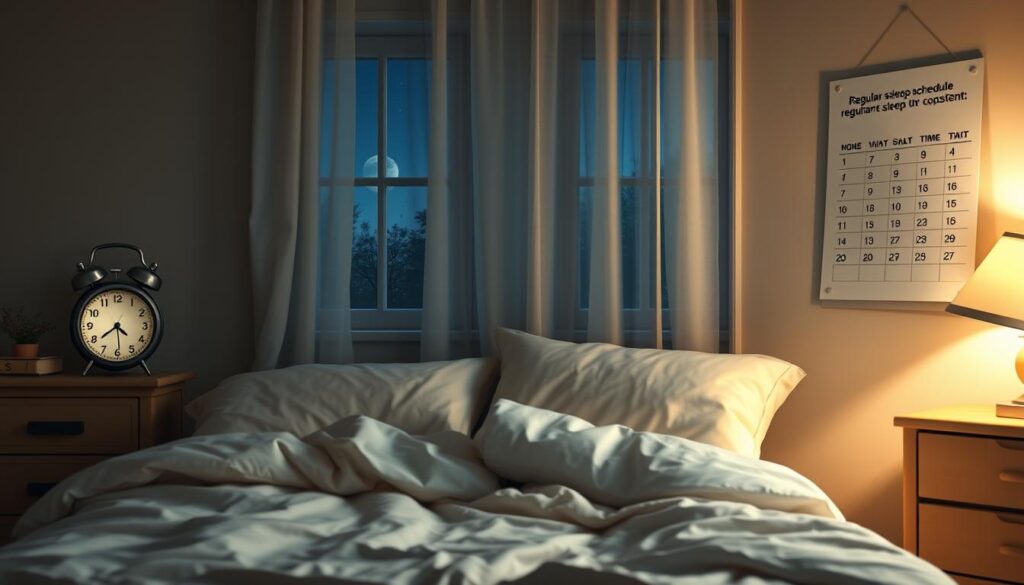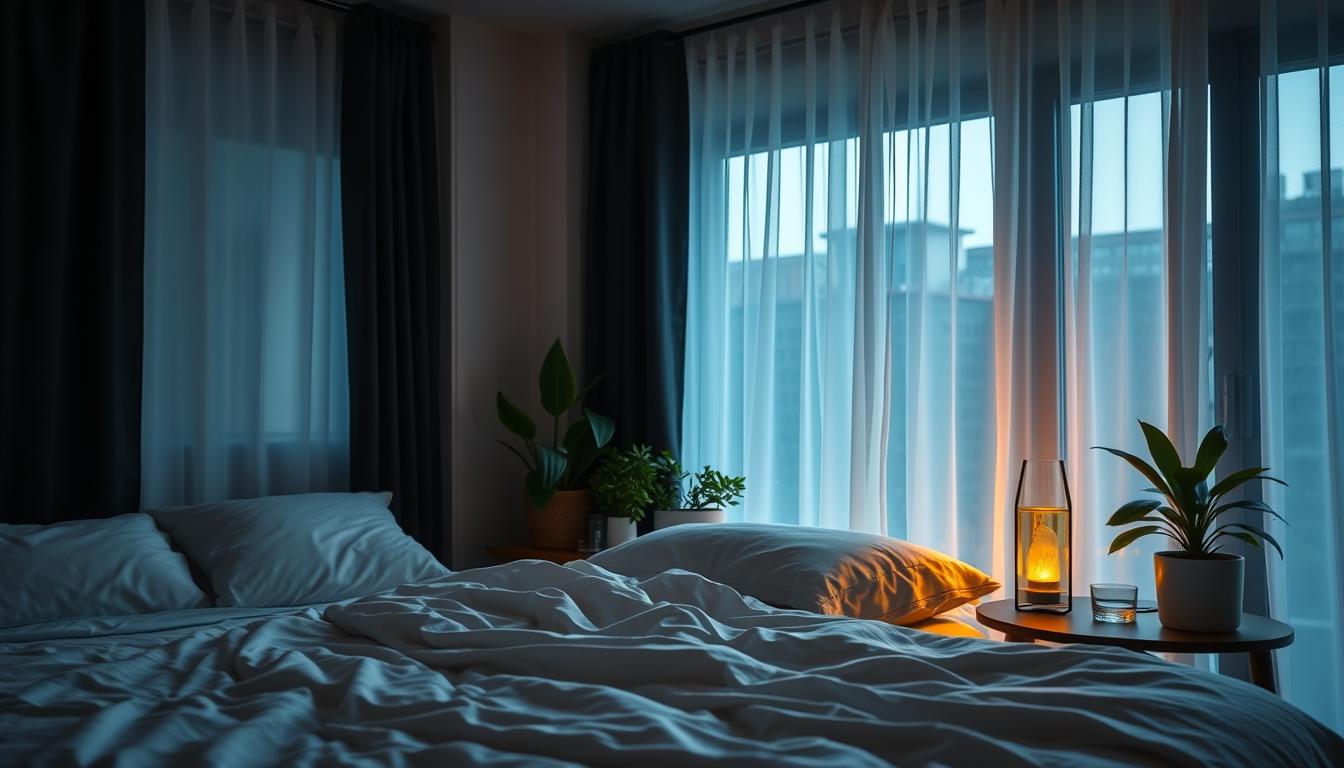
Did you know over 35 million Americans face chronic sleep issues? These problems can really hurt their health and mind. Poor sleep makes people tired and hard to focus. It also makes it tough to bounce back from stress.
In this article, we’ll look at the top 10 habits backed by science. They can help you sleep better and recover faster.
Key Takeaways
- Understand the importance of quality sleep and recovery for optimal physical and mental performance
- Discover how to create the perfect sleep environment to promote better rest
- Learn strategies for establishing a consistent sleep schedule and managing time zone changes
- Explore the impact of nutrition, exercise, and relaxation techniques on sleep quality
- Uncover the effects of digital devices and screen time on sleep patterns
Understanding the Science Behind Quality Sleep and Recovery
Sleep is a complex process that’s key to our health and happiness. Learning about quality sleep and recovery helps us understand how it affects our bodies and minds. It shows how sleep cycles, circadian rhythms, and patterns impact our performance.
The Role of Sleep Cycles in Recovery
The human sleep cycle has different stages, like light sleep, deep sleep, and REM sleep. Each stage has its own role in fixing and refreshing our bodies and minds. Deep sleep helps with muscle repair and growth. REM sleep is important for thinking and remembering things.
How Sleep Affects Physical and Mental Performance
Good sleep is crucial for being physically and mentally sharp. Not enough sleep or sleep disruptions can cause problems. These include slower reaction times, poor decision-making, and lower athletic performance. On the other hand, well-rested people have more energy, focus, and productivity.
Understanding Circadian Rhythm Patterns
- The circadian rhythm is our internal clock that controls our sleep and other body functions.
- It’s influenced by things like sunlight and temperature. But, it can get messed up by jet lag, shift work, and blue light from screens.
- By matching our daily routines with our circadian rhythm, we can improve our sleep and overall health.
| Characteristic | Description |
|---|---|
| Sleep Cycles | The different stages of sleep, including light sleep, deep sleep, and REM sleep, each with unique functions in the recovery process. |
| Circadian Rhythm | The internal biological clock that regulates the sleep-wake cycle and other physiological processes. |
| Physical and Mental Performance | The impact of sleep quality on physical and cognitive abilities, including energy levels, focus, and overall productivity. |

Understanding sleep and recovery helps us make better choices for our sleep. By using this knowledge, we can improve our physical and mental abilities. This leads to better health and more energy in our daily lives.
Creating the Perfect Sleep Environment
Creating a cozy and sleep-friendly space is key for good rest. It’s all about the right temperature and setting up your bedroom just right. These details can really make a difference in how well you sleep.
Temperature is a big deal. It’s best to keep your bedroom a bit cooler than your body temperature. Aim for a temperature between 65°F to 70°F (18°C to 21°C). This helps your body relax and sleep better without interruptions.
- Invest in a high-quality mattress and bedding that provide the right level of comfort and support.
- Use blackout curtains or blinds to minimize light exposure, creating a dark, serene atmosphere.
- Incorporate soft, indirect lighting, such as dimmable lamps or string lights, to set the mood for relaxation.
- Ensure the bedroom is well-ventilated, with adequate airflow and circulation to maintain a comfortable sleep environment.
Also, how you set up your bedroom matters a lot. Experts say to keep it simple and tidy. A messy room can keep your mind racing and make it hard to relax.
“A clean, organized, and calming bedroom setup can significantly improve the overall quality of your sleep.”
By focusing on temperature, lighting, and bedroom setup, you can make a space that helps you sleep better. This can lead to better recovery and overall health.

Establishing a Consistent Sleep Schedule
Getting quality sleep is more than just the hours you sleep. It’s also about keeping a regular sleep-wake routine. A consistent sleep schedule helps your body’s natural rhythms. This leads to better sleep and recovery.
Benefits of Regular Sleep-Wake Times
Sticking to a sleep-wake times routine helps your body adjust to day and night. This improves your sleep quality. It also boosts your brain function, physical health, and overall well-being.
Weekend Sleep Schedule Adjustments
- It’s tempting to sleep in on weekends, but keep your sleep schedule similar to weekdays.
- Avoid big changes in your sleep-wake times on weekends. It can mess up your body’s rhythm and make it hard to sleep on Sunday nights.
- Try to adjust your weekend sleep schedule by only an hour from your weekday routine. This keeps things consistent.
Managing Time Zone Changes
Traveling to different time zones can be tough on your sleep. To adjust, start changing your sleep times a few days before you leave. When you travel, get natural light at the right times. Use blackout curtains or eye masks to block out light. Stick to a regular sleep routine, even if it means missing out on some fun.
| Tip | Description |
|---|---|
| Maintain Consistency | Stick to a consistent sleep-wake schedule, even on weekends, to regulate your body’s circadian rhythm. |
| Gradual Adjustments | When traveling across time zones, gradually shift your sleep-wake times before and during your trip to help your body adapt. |
| Prioritize Rest | During travel, prioritize getting enough rest over sightseeing or social activities to ensure your body can properly adjust to the new time zone. |

By keeping a consistent sleep schedule, you can get the most out of your sleep. This improves your recovery and performance.
Nutrition and Diet Strategies for Better Sleep
Getting quality sleep isn’t just about your bed or bedtime routine. What you eat also matters a lot. Eating the right foods and at the right times can help you sleep better and recover faster.
Eating a big meal before bed can mess with your sleep. This is because your body is busy digesting food instead of resting. Try to finish eating 2-3 hours before you go to bed. This lets your body digest food and get ready to sleep.
- Add foods that help you sleep, like tart cherries, fatty fish, nuts, and seeds. These foods have melatonin and tryptophan, which help you sleep.
- Drinking enough water is key for good sleep. Drinking water all day keeps you hydrated and helps you sleep better.
- Watch out for caffeine and nicotine, especially in the afternoon and evening. They can make it hard to fall asleep.
By matching your diet with your sleep goals, you can get better rest. This improves your overall health and well-being.
“Proper nutrition and timing of meals can have a significant impact on the quality and duration of your sleep.” – Dr. Sarah Johnson, sleep expert
Exercise and Physical Activity Impact on Sleep Quality
Regular exercise can greatly improve your sleep quality. The right physical activities at the best times can help your sleep patterns. This leads to better sleep overall.
Optimal Workout Timing for Sleep
When you work out matters a lot for sleep. It’s best to exercise early in the day, a few hours before bed. This lets your body cool down and your stress hormones settle, making it easier to sleep.
Types of Exercise That Promote Better Sleep
- Aerobic activities like brisk walking, jogging, or cycling can help regulate your sleep-wake cycle.
- Strength training exercises, such as weightlifting, can reduce muscle tension and improve sleep quality.
- Yoga and Pilates are gentle, low-impact exercises that can promote relaxation and better sleep.
Recovery Techniques for Athletes
For athletes, recovery is key to staying at the top of their game and sleeping well. Good recovery methods include:
- Stretching and foam rolling to reduce muscle soreness and tension
- Incorporating active recovery activities like light walking or swimming
- Utilizing compression garments or ice baths to alleviate inflammation
- Practicing relaxation techniques like meditation or deep breathing exercises
| Exercise Type | Impact on Sleep Quality |
|---|---|
| Aerobic | Regulates sleep-wake cycle |
| Strength Training | Reduces muscle tension |
| Yoga and Pilates | Promotes relaxation |
Knowing the best times, types of exercise, and recovery methods can help you improve your sleep. This leads to better overall health and well-being.
Top 10 Habits for Better Sleep and Recovery
Getting quality sleep and recovery is key for health and happiness. By adding these top 10 habits to your day, you can improve your sleep and recovery. These strategies help you sleep better and recover faster.
- Go to bed and wake up at the same time every day, even on weekends.
- Start a calming bedtime routine, like a warm bath or light stretching.
- Make your bedroom cool, dark, and quiet, and use comfy bedding.
- Stay away from blue light from screens for at least an hour before bed.
- Do physical activities during the day but not before bed.
- Use stress-relief methods like deep breathing or journaling.
- Avoid caffeine, big meals, and alcohol close to bedtime.
- Get outside in the daytime to help your body clock.
- Try natural sleep aids like herbs or essential oils.
- Change your sleep schedule when traveling to new time zones to avoid jet lag.
By following these habits, you can improve your sleep and recovery. This will help you feel better physically and mentally. It will also make you happier and healthier overall.
| Habit | Description | Benefits |
|---|---|---|
| Consistent Sleep Schedule | Go to bed and wake up at the same time every day, even on weekends. | Helps your body clock, improves sleep, and boosts energy. |
| Relaxing Bedtime Routine | Do calming things before bed, like reading or meditation. | Helps you relax, reduces stress, and gets you ready for sleep. |
| Optimized Sleep Environment | Make your bedroom cool, dark, and quiet, with comfy bedding. | Creates a sleep-friendly space, reduces distractions, and improves sleep quality. |
By following these habits, you can improve your sleep and recovery. This will help you feel better and live a healthier, more balanced life.
Managing Digital Devices and Screen Time
In today’s world, it’s key to control our digital device use and screen time. This helps keep our sleep quality and overall health good. The blue light from phones, tablets, and computers can mess with our sleep patterns. It makes it tough to fall and stay asleep.
Blue Light Effects on Sleep Patterns
Blue light from our screens tricks our brains into thinking it’s still day. This stops our bodies from making melatonin, the sleep hormone. This can cause trouble falling asleep, restless nights, and less quality sleep.
Digital Curfew Implementation
- Set a “digital curfew” by turning off all devices at a certain time each night.
- Don’t use your phone, tablet, or computer for at least an hour before bed. This lets your body make melatonin and get ready for sleep.
- Use a blue light filter or night mode on your devices to cut down on blue light in the evening.
- Get an old-fashioned alarm clock to avoid using your phone as an alarm.
By setting a digital curfew and cutting down on blue light before bed, you can take back control of your sleep. This leads to better physical and mental health, a better mood, and overall well-being.
“The key to better sleep is to create a sleep-friendly environment, and that includes reducing exposure to blue light from digital devices.”
Stress Management and Relaxation Techniques
Getting better sleep and recovery is more than just a regular sleep schedule or the right sleep environment. It’s also about tackling stress that can mess with your sleep. Stress management and relaxation techniques are key here.
Stress often leads to poor sleep and recovery. Luckily, there are many stress management and relaxation techniques to help manage stress and improve sleep.
Mindfulness and Meditation
Mindfulness and meditation are top stress reducers. They focus on deep breathing and being in the moment. This calms the mind and body, reducing stress effects.
- Guided meditation apps make it easy to add mindfulness to your day.
- Meditating for 10-15 minutes before bed can greatly improve sleep.
Progressive Muscle Relaxation
Progressive muscle relaxation is another great relaxation technique. It involves tensing and relaxing muscles all over the body. This reduces muscle tension and helps you relax, making it easier to sleep.
“Stress management is not just a luxury, it’s a necessity for optimal health and well-being.” – Dr. Andrew Weil
Yoga and Stretching
Gentle yoga and stretching are also good for managing stress. They help release tension, calm the mind, and get your body ready for sleep.
| Technique | Benefits for Sleep and Recovery |
|---|---|
| Mindfulness and Meditation | Reduces stress and anxiety, promotes relaxation, enhances sleep quality |
| Progressive Muscle Relaxation | Decreases muscle tension, induces a state of deep relaxation, improves sleep |
| Yoga and Stretching | Releases physical tension, calms the mind, prepares the body for sleep |
By adding these stress management and relaxation techniques to your routine, you can tackle sleep issues and improve recovery.
Natural Sleep Aids and Supplements
Many people look for natural sleep aids and supplements to help them sleep better. These options are gentler and help the body heal naturally. They can improve sleep quality and support the body’s healing.
Herbal Remedies for Sleep Enhancement
Herbal remedies have been used for ages to help people relax and sleep well. Some top natural sleep aids include:
- Valerian root: Known for its mild sedative effects, valerian has been used for centuries to improve sleep quality.
- Chamomile: This soothing herb is believed to have anti-anxiety properties, making it a popular choice for those seeking a calming pre-bedtime routine.
- Melatonin: Although not an herb, melatonin is a natural hormone that plays a crucial role in regulating the body’s sleep-wake cycle.
Supplement Safety and Efficacy
It’s important to think about the safety and effectiveness of natural sleep aids and supplements. Always talk to a healthcare professional before adding new supplements to your routine. They may interact with other medicines or have side effects. Also, make sure to check the quality and purity of the products you choose. The supplement industry is not well regulated.
Understanding the benefits and risks of natural sleep aids and supplements helps make informed choices. A mix of lifestyle changes, stress management, and natural remedies can lead to better sleep. This balanced approach supports overall health and well-being.
Conclusion
In this article, we explored the science of quality sleep and recovery. We looked at sleep cycles, circadian rhythms, and how sleep affects our bodies and minds. We also talked about how to create the best sleep environment and how to improve sleep through nutrition, diet, and exercise.
The top 10 habits we discussed are a guide to better sleep and recovery. By trying these techniques, you can find what works best for you. This can lead to better physical and mental health, faster recovery, and more productivity.
Quality sleep and recovery are a journey, not a goal. Be patient and don’t give up. If sleep problems persist, seek help from healthcare professionals. By focusing on sleep hygiene, you can reach your full potential and succeed in all areas of life.





